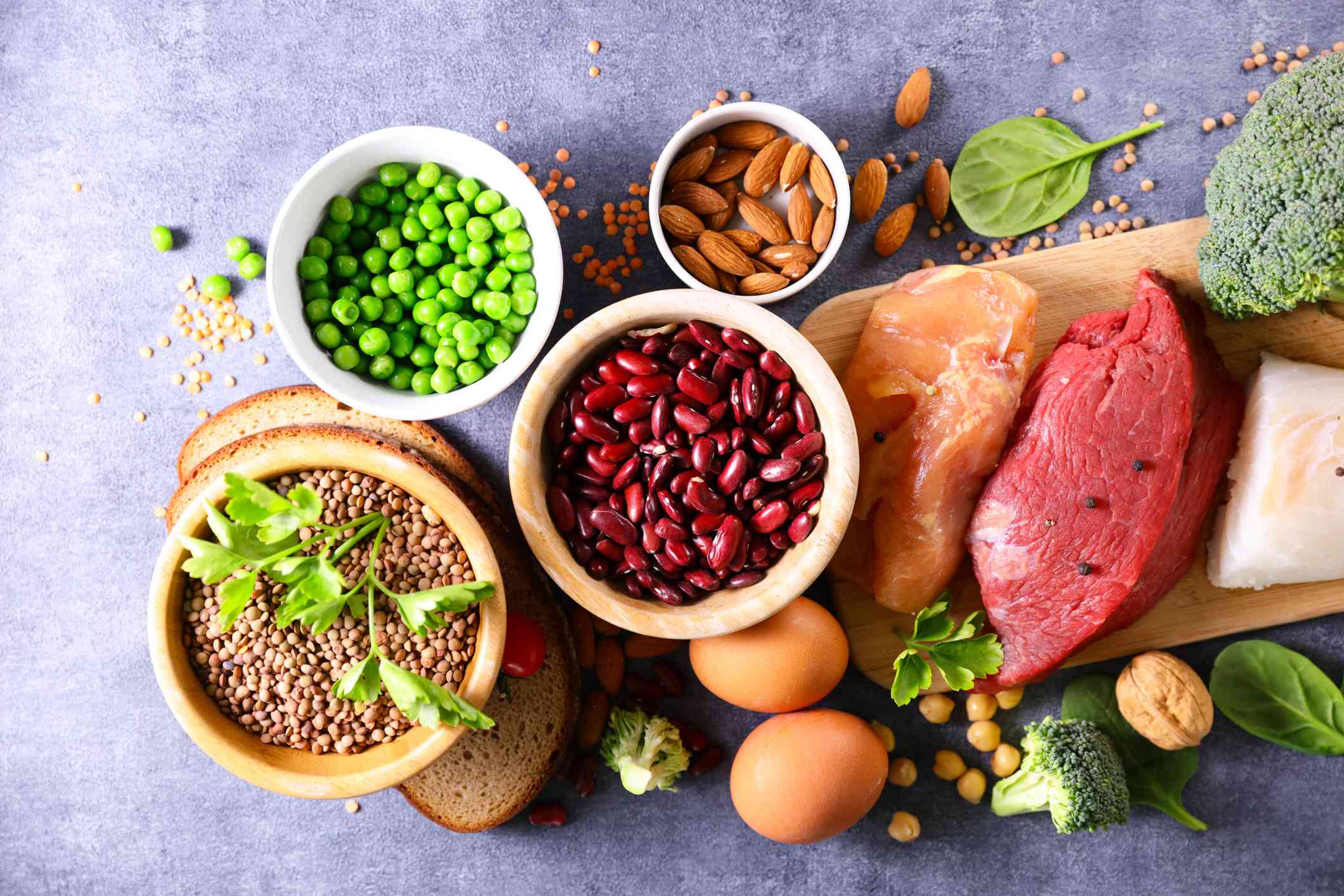
:max_bytes(150000):strip_icc():format(jpeg)/Health-GettyImages-1309167823-b191a8f8e7394aa1a6d6f6fc578c526b.jpg)
Protein is a macronutrient, meaning you need to consume it regularly in large amounts. Protein is necessary for life as it provides the amino acids your body needs for essential processes like immune function, muscle building, and producing hormones and neurotransmitters.
Protein is concentrated in both plant and animal foods, such as eggs, fish, and beans.
Adequate protein intake is essential to health. Studies show that high-protein diets can support and protect health in many ways, such as improving body composition, reducing the risk of bone diseases, and more.
Protein is found in both plant and animal foods. However, there are a few key differences between the protein types. For instance, animal proteins are considered complete proteins, while most plant proteins are incomplete.
Animal Proteins
Animal proteins, like eggs, yogurt, and fish, are categorized as complete proteins because they contain all nine essential amino acids. Your body needs 20 amino acids to function, but only nine are classified as essential.
Histidine, isoleucine, leucine, lysine, methionine, phenylalanine, threonine, tryptophan, and valine are considered essential because your body can’t produce them on its own. Your body can synthesize non-essential amino acids by using other amino acids.
Due to its amino acid profile, animal protein is considered superior to plant-based protein. What’s more, animal foods pack much more protein than plant foods. Though there are some exceptions, animal proteins usually provide more protein gram for gram.
Plant-Based Proteins
Most plant-based proteins are incomplete proteins because they’re missing or low in one or more essential amino acids. Plant-based proteins also have lower muscle-building potential than animal proteins. This is because they have lower digestibility and are low or deficient in essential amino acids that are important for protein synthesis and muscle repair, like leucine.
For this reason, animal-based proteins are generally considered superior to plant-based proteins. It’s typically easier to meet your protein needs when following an omnivorous diet. However, it’s completely possible to meet your protein needs, build muscle, and reach your health goals while following a plant-based diet.
In the past, experts thought plant-based proteins needed to be paired together to make a complete protein, but more recent studies show protein pairing isn’t necessary as long as you’re following a balanced diet. This is because your body has an amino acid pool that it pulls from to build new protein and perform other critical processes.
People who want to consume only plant-based proteins should include a variety of proteins in their daily diets to cover their amino acid needs.
Protein is essential to health. The body needs amino acids—the building blocks of protein—for vital processes such as hormone and neurotransmitter synthesis, immune function, and more.
Higher-protein diets have been linked to several health benefits, including weight management, improved bone density and body composition, and better blood sugar regulation.
Necessary for Bone and Muscle Health
Proteins make up 80% of muscle mass, and maintaining optimal protein is essential for muscle health.
Your body requires a steady supply of amino acids to grow and repair muscle. Studies show that following a high-protein diet is beneficial for supporting muscle growth.
High-protein diets are especially effective for promoting muscle growth when paired with resistance training. Maintaining optimal protein intake can reduce exercise-induced skeletal damage and improve muscle strength.
Protein is also essential for bone health. Following a high-protein diet can protect against fractures and osteoporosis (bone thinning and weakening).
Essential for Many Essential Body Processes
Protein is required for immune function, the synthesis of neurotransmitters, skin and hair health, hormone production, and many other essential processes within the body.
Diets too low in protein can negatively affect overall health and make you more susceptible to getting sick. For example, adequate protein intake is required to build antibodies and white blood cells, which fight off infections and protect you from harmful substances.
Protein is essential for brain function and the production of mood-regulating neurotransmitters like dopamine and serotonin. Amino acids, such as tyrosine, are required to produce these and other neurotransmitters, making optimal protein intake essential for maintaining mental health.
Optimal protein intake can help protect against age-related cognitive decline. Low protein intake is related to dementia in older adults.
Regulates Appetite and Blood Sugar
Protein slows digestion and the absorption of glucose into your bloodstream. This helps you feel full after eating and supports optimal blood sugar regulation.
Protein also stimulates the release of satiety hormones such as glucagon-like peptide 1 (GLP-1), cholecystokinin (CCK), and peptide YY (PYY levels), and decreases levels of an appetite-increasing hormone called ghrelin.
This is why high-protein diets are often linked to improved weight loss and better glycemic control.
Your daily protein needs depend on your body size, health goals, and more.
The Recommended Dietary Allowance (RDA) for protein is currently set at 0.8 grams per kg (g/kg) of body weight, or 0.36 grams of protein per pound (g/lb). However, this isn’t the optimal protein intake you should aim for. The RDA is only the minimum amount of protein necessary to meet the body’s amino acid requirements and prevent health issues like muscle loss.
Though the RDA may be appropriate for sedentary people, research suggests that physically active people need much more protein for optimal health. People who regularly exercise need to consume between 1.2-2.0 g/kg of protein per day (0.54-0.9 g/lb) to maintain their muscle mass.
If you’re trying to gain muscle or lose body fat while maintaining your muscle mass, your protein requirements may exceed 2.0 g/kg per day (0.9 g/lb). People trying to lose weight while gaining or maintaining muscle mass have estimated protein needs between 2.3-3.1 g/kg (1-1.4 g/lb) daily.
Pregnancy, injuries, and acute and chronic illness also significantly increase your protein needs.
There are many protein-rich foods to choose from, including from plant and animal sources.
Animal Proteins
Most meats and animal products offer a good source of protein. Some of these include:
- Chicken breast: 31 g per small skinless chicken breast, or 62% of the Daily Value (DV)
- Whey protein isolate: 25 g per ounce (oz), or 50% of the DV
- Cottage cheese: 23.5 g per cup, or 47% of the DV
- Shrimp: 20.4 g per 3-oz serving, or 41% of the DV
- Canned tuna: 20.1 g per 3-oz serving, or 40% of the DV
- Greek yogurt: 19.9 g per 7-oz serving, or 40% of the DV
- Canned salmon: 19.6 g per 3-oz serving, or 39% of the DV
- Eggs: 6.28 g per large egg, or 13% of the DV
Plant-Based Proteins
Legumes, like beans, lentils, and peanuts, are good sources of plant-based protein. Soybean-based products, like tofu and tempeh, also offer easy plant protein. Examples include:
- Pea protein: 24 g per oz, or 48% of the DV
- Tempeh: 19.9 g per 100-g serving, or 40% of the DV
- Edamame: 18.5 g per cup, or 37% of the DV
- Lentils: 17.9 g per cup, or 36% of the DV
- Hemp seeds: 9.48 g per oz, or 19% of the DV
- Tofu: 8.67 g per 3-oz serving, or 17% of the DV
- Peanuts: 7.43 g per oz, or 15% of the DV
- Garbanzo beans: 14.5 g per cup, or 29% of the DV
Supplements
Many people also use dietary supplements to increase their protein intake.
Protein powders are the most popular type of protein supplement. They can boost the protein content of omnivorous and plant-based diets. Though protein content varieties, most protein powders provide more than 20 g of protein per 1-oz serving.
- Animal-based protein powders include whey protein, egg white protein, casein, and collagen peptides.
- Plant-based protein powders include pea protein, brown rice protein, hemp protein, and soy protein.
As with all dietary supplements, choosing quality protein powders that have been third-party tested for quality and purity whenever possible is recommended.
Research shows that high-protein diets are generally safe for most people, and there’s no evidence that diets providing more than the current RDA harm health.
Studies show that very high-protein diets, providing over 3 g/kg (1.36 g/lb) per day, are not associated with health concerns or adverse side effects in healthy adults.
Though high-protein diets in general aren’t harmful, diets high in specific kinds of high-protein foods, like processed and red meat, can increase disease. For example, following a diet high in red and processed meat can increase your risk of developing colon cancer and heart disease.
High protein intake may also accelerate kidney function decline in people with kidney disease. Talk to your healthcare provider about whether a high-protein diet is right for you.
Protein Deficiency
Protein deficiency is uncommon in the United States, but it’s common in impoverished areas such as India and Africa.
Kwashiorkor is a disease characterized by severe protein deficiency that primarily affects malnourished infants and children. It causes symptoms such as muscle wasting, abdominal distension, liver swelling, and growth issues.
Other populations at risk for protein deficiency include people with advanced cancer and older adults.
Protein is a macronutrient necessary for vital processes such as immune function, muscle growth, and hormone synthesis.
Consuming optimal amounts of protein daily can help cover your body’s amino acid requirements and support healthy body composition, blood sugar regulation, and more.
Plant and animal protein sources can help you meet your protein needs.








